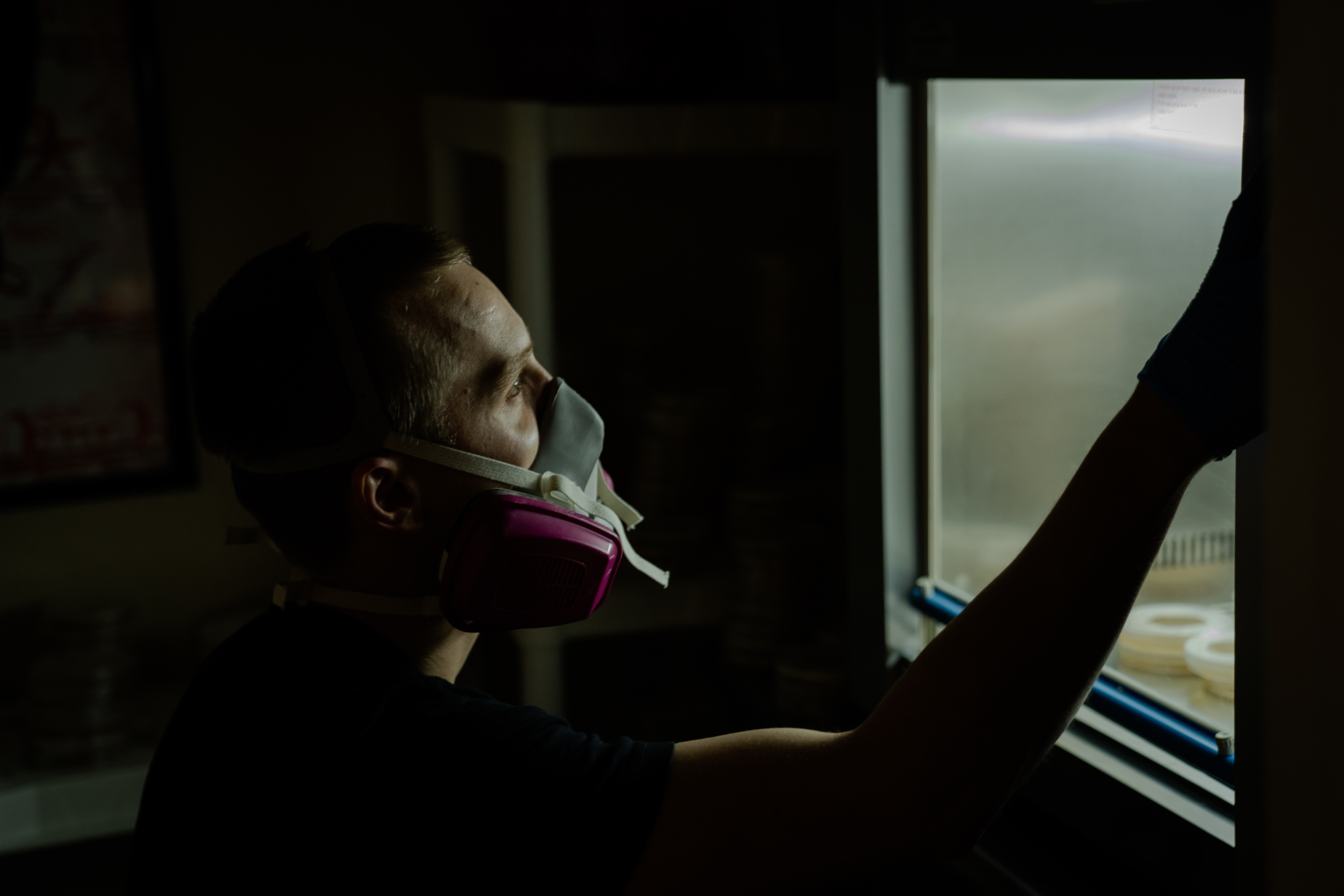
Golden Teacher mushrooms, a term that evokes curiosity and intrigue, refer to a strain of Psilocybe cubensis, a species of psychedelic mushroom whose primary active compounds are psilocybin and psilocin. These mushrooms are famed for their distinctive golden caps and profound impact on users, often associated with insightful experiences that many describe as ‘teaching’ moments. The history of Golden Teachers is as rich and varied as their effects, with roots tracing back to the late 20th century. They are not only a favorite among psychonauts for their spiritual and introspective effects but also among mycologists for their ease of cultivation. The name “Golden Teacher” arises from the mushroom’s ability to impart profound philosophical insights and its shimmering, golden-hued caps. They have a mild potency compared to other psychedelic mushrooms, which makes them a popular choice for those new to the psychedelic experience.
Understanding the Effects of Golden Teacher Mushrooms

Golden Teacher mushrooms are renowned for their potent effects, both physical and psychological. Physically, users may experience sensations of euphoria, synesthesia, and a heightened sense of connection to the environment. Psychologically, they can induce profound introspective insights, emotional catharsis, and a sense of interconnectedness with the universe. The experience can vary greatly from person to person and is influenced by factors such as dosage, individual sensitivity, and setting. Some users report mystical experiences, feeling a sense of oneness with nature or the universe, and gaining deep personal insights. The duration of a Golden Teacher trip can last anywhere from four to eight hours, with the peak occurring around two hours after ingestion. During this time, users might find that colors appear more vibrant, emotions are intensified, and time seems to stretch and change.
Cultivation of Golden Teacher Mushrooms

Cultivating Golden Teacher mushrooms is both an art and a science. The optimal conditions for their growth include a humid environment, stable temperatures, and indirect light. Cultivators often employ techniques such as the PF Tek or monotub methods to grow these mushrooms successfully. These methods are popular due to their simplicity and effectiveness, making Golden Teacher mushrooms a common first grow for many enthusiasts. The cultivation process not only requires patience and care but also a sterile environment to prevent contamination. The substrate used for cultivation typically includes materials like vermiculite and brown rice flour, which provide the necessary nutrients for the mushrooms to thrive. The process from spore inoculation to fruiting can take several weeks, and maintaining the right conditions is crucial for a successful yield.
Golden Teacher Mushrooms and Their Medicinal Uses

Traditionally, indigenous cultures have used Golden Teacher mushrooms for healing and spiritual purposes. Contemporary research is now exploring their potential in treating conditions such as depression, anxiety, and PTSD, with promising findings that could revolutionize mental health treatment. The psilocybin in these mushrooms is thought to reset the brain’s default mode network, which plays a role in self-reflection and thought patterns. This reset can provide relief from the rigid patterns associated with various mental health conditions. Clinical trials have shown that psilocybin therapy, when combined with professional psychological support, can produce significant and lasting reductions in depression and anxiety in patients with life-threatening cancer diagnoses, suggesting a profound potential for healing.
Legal Status of Golden Teacher Mushrooms
The legal status of Golden Teacher mushrooms varies significantly around the world. In some regions, they are decriminalized or legal for personal use, while in others, they remain illegal substances. The debate around their decriminalization is ongoing, with advocates citing their potential benefits and critics expressing concern over misuse. In places like Denver, Colorado, and Oakland, California, there have been moves to decriminalize the use of these mushrooms, reflecting a changing attitude towards psychedelics. However, in most countries, including the United States at the federal level, Golden Teacher mushrooms are classified as a Schedule I drug, which means they are illegal to cultivate, sell, or possess.
The Cultural Impact of Golden Teacher Mushrooms
Golden Teacher mushrooms have had a significant cultural impact, particularly in religious and spiritual contexts where they are used to facilitate transcendental experiences. They have also influenced art and music, with many artists attributing their creative inspiration to experiences with these mushrooms. The ’60s counterculture movement brought them into the public eye, and they have remained a symbol of spiritual awakening and resistance to conventional thinking. The mushrooms have been featured in numerous documentaries and books, often highlighted for their role in the exploration of consciousness and the human psyche.
Golden Teacher Mushrooms in Education and Therapy
In the realms of education and therapy, Golden Teacher mushrooms are gaining recognition for their role in psychedelic-assisted therapy, offering new avenues for treating various mental health issues. Educational outreach and harm reduction programs are essential to ensure safe and informed use. Therapists are beginning to incorporate them into their practices, often in controlled settings, to help patients overcome deep-seated psychological issues. The Multidisciplinary Association for Psychedelic Studies (MAPS) and other organizations are conducting research and providing educational resources to both professionals and the public, advocating for the responsible use of psychedelics as therapeutic tools.
Safety and Risks Associated with Golden Teacher Mushrooms
While Golden Teacher mushrooms can offer profound experiences, they also come with potential risks and side effects, such as nausea, disorientation, and psychological distress. Adhering to guidelines for safe consumption, including proper dosing and the presence of a sober guide, is crucial. It is also important to consider the setting in which they are used, as a comfortable and safe environment can greatly influence the experience. Users with a personal or family history of psychosis or other severe mental health disorders should exercise caution, as psilocybin mushrooms can exacerbate these conditions.
Golden Teacher Mushrooms in Popular Culture
Golden Teacher mushrooms have permeated popular culture, with references in films, books, and music. However, public perception is often riddled with misconceptions, highlighting the need for accurate information and education. They are often portrayed in a mystical or sometimes negative light, without a balanced view of their potential benefits and risks. As the conversation around mental health and alternative therapies grows, Golden Teacher mushrooms are increasingly becoming a topic of interest in mainstream media, challenging stereotypes and inviting a more nuanced discussion about their use.
Comparing Golden Teacher Mushrooms to Other Psychedelics
When compared to other psychedelics, Golden Teacher mushrooms offer a unique experience. Users often report a gentler, more introspective trip compared to other substances, though experiences can vary widely. They are often recommended for beginners due to their moderate potency and the ability to induce profound experiences with less intensity than other psychedelics. For instance, compared to LSD, the effects of Golden Teacher mushrooms are often described as more natural and grounding, whereas LSD can sometimes lead to more intense and energetic experiences.
The Future of Golden Teacher Mushrooms
The future of Golden Teacher mushrooms looks promising, with ongoing research into their therapeutic potential and a growing movement towards their acceptance. As societal attitudes shift, these mushrooms may play a significant role in mainstream culture. The potential for these mushrooms to aid in mental health is becoming increasingly hard to ignore, and they may soon be part of regular therapeutic practices. With the rise of microdosing — taking sub-perceptual doses of psychedelics — Golden Teacher mushrooms are also being explored for their potential cognitive and emotional benefits without the intensity of a full psychedelic experience. This practice has been reported to improve creativity, productivity, and overall well-being, and is becoming a subject of scientific study.
How to Identify Golden Teacher Mushrooms
Identifying Golden Teacher mushrooms requires knowledge of their physical characteristics, such as their golden caps and the nature of their spores. Foragers should always exercise caution and seek expert advice to ensure safe identification. They typically have a distinct appearance with a slightly curved cap with a yellow or golden center. The caps are usually about 2 to 8 centimeters in diameter with a unique, almost nipple-like protrusion at the center. The stems are long and slender, and the gills are closely spaced. When bruised or aged, parts of the mushroom can turn a bluish color due to the oxidation of psilocin. It’s important to note that there are many look-alikes in the wild, some of which are poisonous, so proper identification is crucial for safety.
Cooking and Preparation of Golden Teacher Mushrooms
Cooking with Golden Teacher mushrooms is a creative endeavor, with numerous recipes available for those interested in culinary exploration. It’s important to consider dosage and potency to ensure a safe and enjoyable experience. They can be used in teas, chocolates, or even as part of a meal, but it’s crucial to start with a low dose, especially for those who are inexperienced. When preparing these mushrooms for consumption, many users prefer to dry them first, which can concentrate their potency and allow for more precise dosing. They can also be ground into a powder and encapsulated for microdosing purposes. When cooking, it’s best to add them at the end of the recipe to minimize heat exposure, which can degrade the psilocybin.
Personal Growth and Golden Teacher Mushrooms
Many individuals report experiences of personal growth and transformation following their use of Golden Teacher mushrooms. Approaching these experiences with intention and respect is key to gaining the most from what they have to offer. Users often describe a sense of renewed perspective on life and personal issues, leading to significant changes in behavior and outlook. The mushrooms can act as a catalyst for deep self-reflection, allowing users to confront inner challenges and explore their consciousness. It’s not uncommon for users to report lasting positive changes in their life outlook, relationships, and overall sense of purpose following an experience with Golden Teacher mushrooms.
Conclusion
Golden Teacher mushrooms are a fascinating subject, offering a complex blend of history, culture, and potential therapeutic benefits. As research continues and public interest grows, these mushrooms may well become a significant part of our approach to personal growth and mental health. They stand at the intersection of ancient tradition and modern science, a natural key to unlocking the mysteries of the mind. Whether used for spiritual exploration, personal growth, or therapeutic purposes, Golden Teacher mushrooms hold a special place in the pantheon of natural psychedelics, offering a gentle yet profound experience that has captivated humans for decades.
FAQs
- What are Golden Teacher mushrooms? Golden Teacher mushrooms are a strain of Psilocybe cubensis, which is a species of psychedelic mushroom. They are known for their distinctive golden-colored caps and are popular for their moderate potency and the profound experiences they can induce.
- Are Golden Teacher mushrooms legal? The legal status of Golden Teacher mushrooms varies by country and region. In many places, they are classified as a controlled substance and are illegal to cultivate, possess, or distribute. However, there are areas where they have been decriminalized or are legal for personal use.
- How do Golden Teacher mushrooms affect the mind? Golden Teacher mushrooms contain psilocybin, which is converted to psilocin in the body and affects the serotonin receptors in the brain. This can lead to altered perceptions, emotional shifts, and profound changes in consciousness, often leading to spiritual or introspective experiences.
- Can Golden Teacher mushrooms be used for therapy? Yes, there is a growing interest in using Golden Teacher mushrooms and other psychedelics in therapeutic settings, particularly for treating conditions like depression, anxiety, and PTSD. Research is ongoing, and some promising results suggest that they can be effective when used with professional support.
- How do you safely consume Golden Teacher mushrooms? To safely consume Golden Teacher mushrooms, it is important to start with a low dose, especially if you are inexperienced. Ensure you are in a safe and comfortable environment, preferably with a sober guide or sitter. It is also crucial to confirm the mushrooms are correctly identified to avoid consuming toxic look-alikes.
